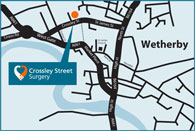There are lots of things you can do to make the most of your GP and appointments. This page explains what you can do to ensure you get the best possible care
Help reduce the time it takes to see a GP by ensuring that booked surgery appointments really are necessary. If you tell the receptionist what the issue is, they can direct you to the best person to deal with your problem.
If there is more than one problem you wish to cover, please prepare a clear “list” and let the GP know immediately at the start of the consultation what all the issues are, It helps if you can establish a chronology – what order things happened in, and over what period of time. This can help GPs rule out some things and point to others.
Be realistic: a “10-minute appointment” includes the time taken to review your notes before you are seen and make records afterwards. This leaves limited time to deal with a single significant problem, particularly if an examination is needed. If you think you have more than one significant problem, please ask for a double appointment. If you are attending the surgery for a follow -up, for example of test results, give a 10- second précis of why you’re there. For example, “I’d been feeling very tired, and so you organised some tests”.
- For minor ailments you can safely treat symptoms at home, for example through rest or with appropriate over the counter medicines. Many minor problems can be dealt with by the local chemist, e.g. warts, verrucae, athlete’s foot, head lice, threadworms and minor ailments such as coughs and colds.
- It is possible to book a “telephone consultation” when you think you don’t need to see the GP in person, e.g. to discuss your medication or a recent test result.
- Use trusted online services for sensible advice and initial guidance on your health (see below).
Problems with hospital care and outpatient appointments need to be dealt with by contacting the hospital directly or the Patient Advice and Liaison Service (PALS). The Leeds PALS can be contacted on 0113 206 6261 and the Harrogate PALS (known as the Patient Exeperience Team) can be contacted on 01423 555 499.
Try asking your GP “what can I do to help myself?” Check what’s been agreed at your appointment e.g. what you’re doing, what the GP’s doing.
Remember your follow up plan. For example, if you have been told your next review is in 12 months and that you should have a blood test before, please make a note on your calendar to do this.
If you may need an examination please dress accordingly. Loose trousers to show your knee, or slip on shoes rather than lace up boots if you’ll need to remove them.
Ideas: What do you think the diagnosis could be? Are you worried about cancer?
Concerns: What worries you about this problem or the impact this will have on your life?
Expectations: What were you hoping the GP could do for you (reassurance, tests, treatment or referral)?
Get Online at the Surgery
By registering for our online service, you could avoid the queues – you can book appointments and order repeat prescriptions online.
Not Happy With Your Care?
Remember GPs are people. We are patients too. We are fallible. We do our best under unprecedented pressure, but things do, and will, get missed occasionally. So, don’t feel uncomfortable to come back and tell us your concerns and work with us to make things right for you, or to help us learn how to do better next time.
Do your research before you go to the surgery. Here are five trusted websites you can use:
NHS Website
The huge NHS website includes comprehensive health information, service directories, and reviews and ratings of health and social care services.
Patient
Started by GPs and now owned by EMIS, the computer system provider for GPs, it has just the right level of detail on health and medicines.
Healthtalk
Patients are recorded talking about their conditions, from atrial fibrillation to arthritis. Great for finding out what it’s really like to have a condition.
Lab Tests Online
Practising lab doctors and scientists explain your lab tests, from what to expect, to what the results mean.
Clinical Knowledge Summaries
How your GP reviews the current evidence on how to treat you. Technical but comprehensive.



